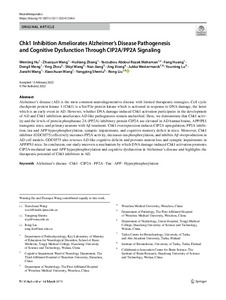Chk1 Inhibition Ameliorates Alzheimer's Disease Pathogenesis and Cognitive Dysfunction Through CIP2A/PP2A Signaling
Hu Wenting; Wang Zhuoqun; Zhang Huiliang; Mahaman Yacoubou Abdoul Razak; Huang Fang; Meng Dongli; Zhou Ying; Wang Shiyi; Jiang Nan; Xiong Jing; Westermarck Jukka; Lu Youming; Wang Jianzhi; Wang Xiaochuan; Shentu Yangping; Liu Rong
Chk1 Inhibition Ameliorates Alzheimer's Disease Pathogenesis and Cognitive Dysfunction Through CIP2A/PP2A Signaling
Hu Wenting
Wang Zhuoqun
Zhang Huiliang
Mahaman Yacoubou Abdoul Razak
Huang Fang
Meng Dongli
Zhou Ying
Wang Shiyi
Jiang Nan
Xiong Jing
Westermarck Jukka
Lu Youming
Wang Jianzhi
Wang Xiaochuan
Shentu Yangping
Liu Rong
Springer
Julkaisun pysyvä osoite on:
https://urn.fi/URN:NBN:fi-fe2022081154144
https://urn.fi/URN:NBN:fi-fe2022081154144
Tiivistelmä
Alzheimer's disease (AD) is the most common neurodegenerative disease with limited therapeutic strategies. Cell cycle checkpoint protein kinase 1 (Chk1) is a Ser/Thr protein kinase which is activated in response to DNA damage, the latter which is an early event in AD. However, whether DNA damage-induced Chk1 activation participates in the development of AD and Chk1 inhibition ameliorates AD-like pathogenesis remain unclarified. Here, we demonstrate that Chk1 activity and the levels of protein phosphatase 2A (PP2A) inhibitory protein CIP2A are elevated in AD human brains, APP/PS1 transgenic mice, and primary neurons with A beta treatment. Chk1 overexpression induces CIP2A upregulation, PP2A inhibition, tau and APP hyperphosphorylation, synaptic impairments, and cognitive memory deficit in mice. Moreover, Chk1 inhibitor (GDC0575) effectively increases PP2A activity, decreases tau phosphorylation, and inhibits A beta overproduction in AD cell models. GDC0575 also reverses AD-like cognitive deficits and prevents neuron loss and synaptic impairments in APP/PS1 mice. In conclusion, our study uncovers a mechanism by which DNA damage-induced Chk1 activation promotes CIP2A-mediated tau and APP hyperphosphorylation and cognitive dysfunction in Alzheimer's disease and highlights the therapeutic potential of Chk1 inhibitors in AD.
Kokoelmat
- Rinnakkaistallenteet [27094]
